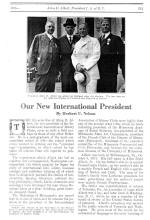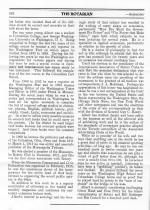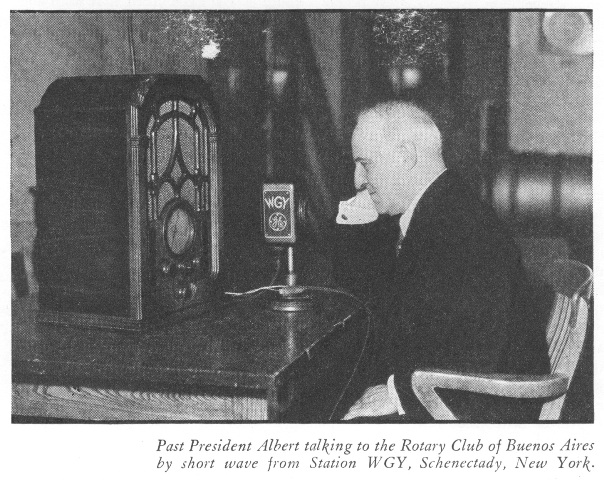|
  The
Past President’s Page The
Past President’s Page
[The Rotarian, December, 1934]
The Tree That is Rotary
By
Allen D. Albert
President, Rotary International, 1915-16

You younger Rotarians who love your gardens will have an
understanding of us who are older in the service.
How often have you set out a seedling and called across the lawn
when you first made sure that the new green of a young shoot was
really showing through the bark. You know how your love for the
seedling surpasses that you have for the tree which you or
another gardener transplanted after it was almost grown. Well,
the same intertwining comes to us who watch the years minister
to an organization as they do to your seedling: the shoots
become branches, the trunk thickens, the tree takes shape and
gives itself a crown, and the seeds it blows away on the summer
winds make new seedlings the next spring.
Which of us is so uncomprehending that he does not stand in awe
before the miracle of growth? Which of us that has nurtured a
seedling but counts himself fiber of its fiber, life of its
life?
Rotary is young in 1934, but already it has the proportions of
maturity. Like the tree that only yesterday was a sapling, it
spreads a comforting shade on the ground below and with
springing branches weathers the storm which tears other trees
apart. Look upon the Rotary tree, young Rotarians, and share our
older pride in it! Look upon it and reflect upon the cycles of
trees, how at the first they are all seedlings, then saplings,
then spreading with growth, then indifferent to the first dead
wood, then dying in certain branches (often the branches that
are the hardest to see, on the inside, nearer the trunk) and
then, while men contend for their fruit, emerging further and
further to an ultimate and gaunt barrenness.
One source of sturdiness in the Rotary tree has been that it has
never been grafted to grow more than one kind of fruit. From the
first coming together of delegates from several clubs, now
twenty-four years ago, we have had only one objective - the
development in the individual Rotarian of a new capability to
serve others. Every year since the second convention, in
Portland, I suppose, men have come to each succeeding gathering
afire with devotion to some fine movement for the public weal,
appealing to us to make Rotary more definite, to make it count
for something, as they might put it; and every year Rotary has
found the wisdom, after hearing their pleas, to stick to the one
work which distinguishes it from associations of commerce, civic
bodies, neighborhood improvement groups. Rotary would not have
gone to the heart of the world if it had been only a "luncheon
club." It has gone to the heart of the world because it spoke to
the world of man's larger possibilities of service.

I
remember that in the early days I spoke thus of Rotary to a
visitor from one of the older cultural centers of Europe. He was
alert with that curiosity which is the beginning of sympathy and
lie heard me with unconcealed wonder. I remember how he took
away my American breath for a moment with this comment:
"Such an appeal would be strong, I should say, to the men of a
country as old as mine. But I am truly surprised to find it
should have such a response in a land so near the hand‑to‑hand
contentions of pioneering as the United States."
He
had not learned one of the best lessons Rotary has to teach. It
came to me in 1911, and I voiced it to the convention of the
next year at Duluth. Like the passer‑by in The Passing of the
Third Floor Back, I said to the convention, "Rotary summons
men to respond to their best impulses. It is part of the wisdom
of the Most High - by whatever name in our several faiths we
identify Him ‑ that men everywhere will heed the call to come
and grow in His likeness. That is one of the strongest evidences
of their brotherhood together. So, when Rotary summons them to
their best selves, men lift up their heads in every land. The
best things in us are not confined by national boundaries."
Those of us to whom Rotary was thus revealed in that early time
hardly dared to hope for what we all know now as the Sixth
Object. We foresaw in a world‑wide fellowship of men who loved
peace one of the highest expressions of the good that is
inherent in us. But we did not talk of it very much ‑ and the
reason was that we were then intent on arousing ourselves to
express that same good in our relations to our craft, our
neighborhood, our home. Before Rotarians should be reaching out
to international influence, we told each other, let Rotary prove
its mettle in the smaller, homelier, simpler ministry at the
elbow of the individual Rotarian.
Apparently it has so proven itself, for Rotary as an
international force is recognized today in every chancellery. In
my own experience, ministers of foreign affairs have asked
whether it were good or ill to have their ambassadors become
members of Rotary clubs in the capitals
to
which they were accredited. We have read how Rotary in one great
city was besought by all parties to forfend continued
revolution. Another great people finds in Rotary a kind of
social and governmental cement to hold together leaders of
several geographical districts. Two nations are at war at the
very moment when I write these words on my typewriter; but it is
God's great mercy to His children that the Rotarians of the two
nations are not at war with each other.
The thickheadedness of war, the waste of it, the payment for it
in values that are forever sacrificed‑the blood of boys, the
talents of young men, the head of the table made empty in young
households, the ache of incurable loneliness in the, hearts of
mothers and fathers ‑ in the end these manifest overcharges for
an international process, which never yet settled any dispute,
must move men to end it. In the meantime it is my judgment that
a league of nations and an international court will help them
perceive the possibilities of better methods.
But a league of nations and an international court are not
proper concerns of Rotary International. Let it be occupied in
the fostering of the goodwill upon which the reduction of war
must depend at 'every crisis. This is a field in which Rotary
has no rival and none too many associates. I look into my heart
and find there the warm consciousness of affection extended unto
me by my Rotary brothers in Berlin and Hangchow, in Tokyo and
Stockholm, in Havana and Hamilton, and I know that their nations
and mine are never to war against each other with our assent.
These are the fields of Rotary: it works in the breast of the
Rotarian to make him a better craftsman, a better citizen, a
better houseman; and it works in the breasts of men throughout
the world to make and keep them good neighbors.
Surely this is enough to keep Rotary busy. It does not need to
legislate upon tariffs, to prove itself by its works even in
such a cause as that of curing cripples. For twenty‑nine years
it has accepted the high responsibility of calling forth from
its members the practical expression of their best impulses not
as to tariffs, only, or tariffs plus community chests, but in
all the relations of the Rotarian. In this singleness of
purpose, Rotary has its greatest distinction.
Will Rotary yield on someday in the indefinite future to some
such cycle as that which I have cited for the tree? I think it
is not for us to answer that question. Our business is to see
that Rotary thrives in health and usefulness in our own time.
I
see no overshadowing danger threatening it. I am convinced it is
justifying itself with rather less than more of yielding to our
common human tendency to scatter our energies and change our
objects. I conceive it to be on the threshold of a service of
true magnificence. I would that other Rotarians might peer into
the future with me and share the vista.
For that very reason I devote to Rotary's single purpose my
contribution to the series of article by men who have served as
Rotary's presidents. The allurement of mere bigness is ever
threatening. If Rotary did not add a single club to its roll in
the next ten years, if its total membership did not grow by a
single unit in that time, and it should teach its lesson of
unique responsibility, of unit service, of a brotherhood of
those who love peace throughout the world, to even half of its
members, it would be honored so long as men should live to
revere human character and rejoice in the maintenance of peace
between the nations.
|

